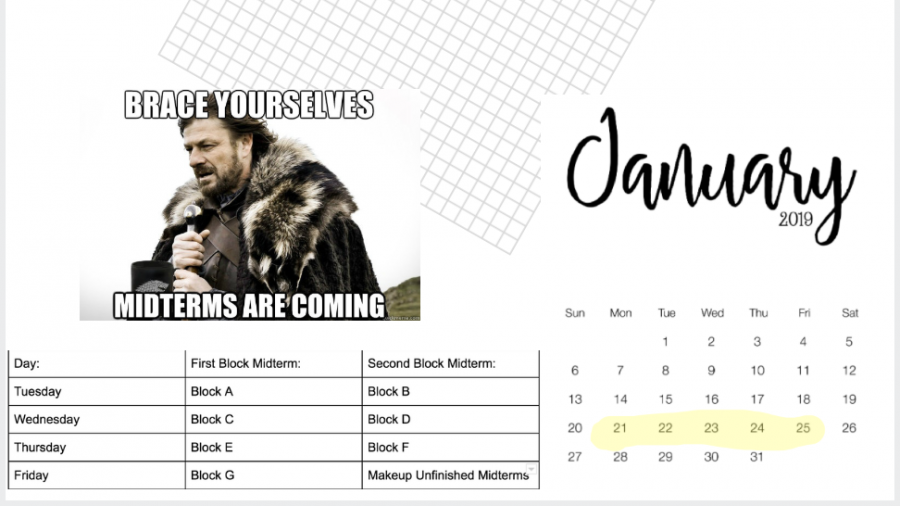‘Tis the season
January 7, 2019
‘Tis the season for stress levels to skyrocket as students will soon take a test that determines the bulk of their semester one grade. ‘Tis the season for many sleepless nights and cramming four months of information for the sake of a two-hour exams. ‘Tis the season for cramped hands from writing too much as students try to show how much they have learned during the semester. ‘Tis the season for midterms.
During the month of January, the cheery mood from the holidays and the kickoff to the New Year hits a brick wall; midterms. As students cram and prepare for the week of exams, many teens struggle with stress and pressure to study. However, there are many ways to help students reduce their stress levels in order to establish a peaceful outlook.
In general, midterms count for 20% of a student’s grade for the first semester, and final quarter grades each share a 40% impact. However, last year, teachers sat down to discuss altering the weight or format of midterms. Many schools are changing the traditional week of exams to project and essay-based work to help students actually learn the material rather than just memorizing possible test questions.
Each midterm test is roughly two hours long, and students usually leave the building at around noon each day to begin studying for the next day’s tests. The first exam of the day will take place at 8:00 and go till 10:00. The second exam will be from 10:30 to 12:30. If an extra half an hour is needed to complete a midterm, you teacher may provide extra time.
Two ninth graders approached the main office. Sitting down in the mahogany wooden chairs we waited to ask about our next four years of testing. Waiting to here about a possible amend to our current midterm exam. Mr. Tracy expressed his thoughts on midterm exams. Even Mr. Tracy admits, “A lot of it is an exercise for who can memorize the most rather than practice the material.” He understands that the weight of midterms can be daunting for some students and wants to help shape an improved setting, including projects that will be graded at the end of the semester. Mr. Tracy also mentioned that he wanted to measure something valuable that students have learned in the first semester.
Be sure to “ask lots of questions for your teachers… go to your teachers in powerblock, after school, and before school. Teachers in general are helpful, [however] you need to prepare for them now.” He also discussed the possibility of changing the balance of mid year exams. In order to amend the present guidelines on midterms, he established that teachers, parents, and students should discuss the weight and format of the tests. “It would be helpful to have a project that best represents who you are.”
Senior Jake Sturim explained many of his views on taking the midterm exams from previous years. “The teachers always spend a week reviewing with you and present you with information you need to study.” In order to help prepare for the test taking, Jake tries to “make a study guide going into it… make sure you are able to recollect information and know you are studying the right stuff.”
He explains that students should “study as much as they can and make sure they have all of their materials for the week of exams.” Jake suggests that students get a head start in organizing materials and studying with help from your teachers as a big strategy for exam week.
According to a study by the National Library of Medicine and National Institutes of Health, stress produces mental and physiological reactions throughout the body. In the examination process, students were known to experience stress causing illness such as anxiety and did not benefit on their tests as a result of their hard work and studying.

Freshman Hannah Pasquarello is crammed with studying for midterms as she is found stressed in the hallway.
The General Consensus has some tips for making good study habits, and getting prepped for midterms. If you need to start getting ready, here are our best pieces of advice.
Make a Study Schedule:
Studying should be well organized and spaced out over a span of time so students can focus on certain areas of review. To many students, it may seem like all they’re doing is studying in the weeks before midterms, however creating a study schedule can help students spend a lot less time cramming. Studying should consist of roughly 25 minute time intervals distanced with breaks for your brain to properly recollect new material. It might be helpful to write a list of the questions and topics you need to study and marking down how much time you have studying for each.
Create a Group to Study With:
By making study groups, students can learn from each other and help one another. This can be helpful to students who can share their notes and help each other develop notes and ideas. Plan to meet in smaller groups that consist of classmates that will focus and stay on task during review. Plan to meet a few times before the midterm in order to ensure that all members have a good understanding of the topics.
Meet With Your Teachers:
When studying for midterms, students should first meet with their teachers in order to make sure they are studying the right material. Students should also schedule meetings with teachers before school, during powerblock, or after school to receive extra help. While you are studying, make sure to write down anything you are confused on or have a questions about. Make sure the teacher is aware that you are interested in meeting with them.
Study With Notes and Previous Tests:
By preparing yourself with any lesson plans and assignments from the first semester, you can practice problems that could potentially be on the exam. Teachers will often pull problems or questions from previous tests and quizzes for the midterm, so look over your old exams to get some extra practice.
Understand That Each Subject is Different:
It’s important to understand that the classes you take are very different, so you may need to create different study plans for each class. Many of the classes have shifted toward essay prompts or projects rather than tests for the block of midterms. In the event of an essay, study possible prompts or evidence that can help strengthen your claim. Each class requires a use of different skills, so make sure you know what you’re doing before you go in.
Mix it Up:
If studying has made you tired, don’t be afraid to take a break and shift your mindset to another subject. Set certain goals to study for in certain time intervals. For example, if you study for roughly 25 minutes and find yourself losing attention span, change to a different subject and study it for 25 more minutes.
Create a Study Pattern:
When creating a calendar for studying, you can have an organized layout of what classes to study for. By developing an understanding for the amount of studying in each class, students can exhibit better knowledge for each subject. Calendars allow you to focus on certain areas of the studying process.
Change the Scenery:
After staying in the same area after a prolonged amount of time, it is difficult to keep concentration. If you find yourself drifting away, try switching the scene, and see if a new location might help you focus up.
Get Good Sleep:
A good amount of sleep can go along way! It’s better to receive a proper night’s sleep than to stay up studying the material. The amount of sleep you receive can determine how mentally ready you are for the test the following day.
Stay Positive:
It is important to maintain an optimistic view on studying and creating a safe environment to study within. If you think negatively about a subject, you may dwell on the grade or result. However, a positive plan for testing can prevent anxiety, as well as create a beneficial plan for testing.

Freshman students from left: Hannah Pasquarello, Ariel Greenberg, Hannah Vidu, and Sarah Mcmahon are forming a study group in the hallway for their language classes.
Midterms have a weight on your overall semester grade, and it can be stressful to study and plan for the exam week. These pieces of advice can help shape a stronger study system for you to balance time with school work and relieve certain areas of stress.
Hopefully within the next few years, we can amend the process of midterms and create projects of material to be graded rather than the event of exams. Good luck on the week of midterms!

